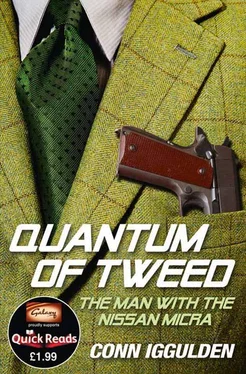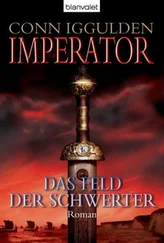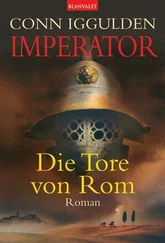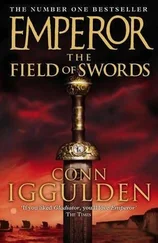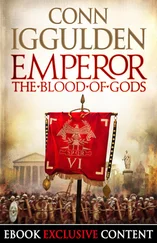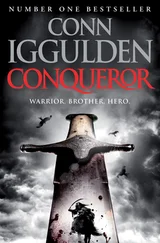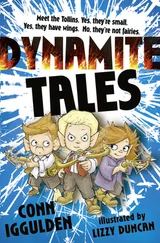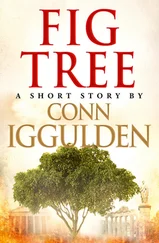Conn Iggulden - Quantum of tweed
Здесь есть возможность читать онлайн «Conn Iggulden - Quantum of tweed» — ознакомительный отрывок электронной книги совершенно бесплатно, а после прочтения отрывка купить полную версию. В некоторых случаях можно слушать аудио, скачать через торрент в формате fb2 и присутствует краткое содержание. Жанр: Иронический детектив, на английском языке. Описание произведения, (предисловие) а так же отзывы посетителей доступны на портале библиотеки ЛибКат.
- Название:Quantum of tweed
- Автор:
- Жанр:
- Год:неизвестен
- ISBN:нет данных
- Рейтинг книги:5 / 5. Голосов: 1
-
Избранное:Добавить в избранное
- Отзывы:
-
Ваша оценка:
- 100
- 1
- 2
- 3
- 4
- 5
Quantum of tweed: краткое содержание, описание и аннотация
Предлагаем к чтению аннотацию, описание, краткое содержание или предисловие (зависит от того, что написал сам автор книги «Quantum of tweed»). Если вы не нашли необходимую информацию о книге — напишите в комментариях, мы постараемся отыскать её.
Quantum of tweed — читать онлайн ознакомительный отрывок
Ниже представлен текст книги, разбитый по страницам. Система сохранения места последней прочитанной страницы, позволяет с удобством читать онлайн бесплатно книгу «Quantum of tweed», без необходимости каждый раз заново искать на чём Вы остановились. Поставьте закладку, и сможете в любой момент перейти на страницу, на которой закончили чтение.
Интервал:
Закладка:
Halliday had not been a pleasant man before the heart attack. On the morning of 11 September 2001, when planes were hijacked over New York, the last communications sent by mobile phone and picked up across the world were, with one exception, heartfelt and moving messages of love. That exception had been the one left on the answering machine of John Halliday. It had come from his own brother.
‘I haven’t got long now,’ his brother had said over the noise of roaring aero engines. ‘I just wanted you to know that you… are a complete shit.’
Being run over and suffering a heart attack had done nothing to improve the personality of a man already capable of inspiring such dislike. He had not seen a white light or spoken to an angel. If he had, he would have punched that angel in the kidney.
According to the nurses, the police still wanted to speak to him, though it seemed they thought of him as some sort of bizarre victim. It hadn’t helped that his false teeth had been knocked out in the collision with Albert Rossi’s Micra. A very young policeman had bagged them as evidence, much as an iPhone-using schoolboy might have regarded a relic from the distant past, like a codpiece, or a cassette player. Without the teeth, Halliday had experienced enormous difficulties making himself understood.
His mood had worsened still further when his dentures were finally returned. Some well-meaning soul had decided that they needed to be disinfected. Presumably they had been popped into a glass of neat bleach out of kindness, but the result was the pink plastic gums had whitened as much as the false teeth. When he smiled now, people backed away as if from a shark — perhaps even a shark in an advert for Colgate toothpaste, with real gleam.
Halliday did not understand why they hadn’t found his gun, but there was no police guard sitting by his bed, and over the previous week they appeared to have forgotten about him. As it happens, Halliday did not want to speak to the police at all. He might have vanished from the medical care unit on a quiet night if they hadn’t put him on a catheter. It worked a lot better than handcuffs, he discovered. You can wrench and struggle against handcuffs. With practice and skill, you can even pick the lock. A tube leading straight up your penis is quite a different matter.
He resolved to wait. Someone would pay for every humiliation. They would pay for the shockingly white smile, the bed baths and the bruises. They would pay for the irritating old lady across the room who kept throwing grapes at him. They would pay for every moment of pain and weakness he had suffered. He did not yet know the name of Albert Rossi. If he had, it would have given focus to waking moments filled with the desire for revenge.
Halliday could have made a certain phone call from the bed. He was not used to the idea of subcontracting work, but a single call could set very dark forces in motion. The idea was certainly tempting. However, this was personal, perhaps a more personal debt than he had ever known before. Halliday knew about debts. Up to that point in his life, he had settled every last one of them himself.
With cheerful thoughts of murder and Micras wafting through his head, he fell asleep once more.
Chapter Five
Albert Rossi sat on a chair by his bed, sucking his finger where he had caught it trying to reload the Colt pistol. He didn’t have the internet himself, but a visit to the local library had revealed that it was a semi-automatic and, though obsolete, had once been a favourite with American armed forces. He liked that. He liked everything about the gun. He found his fingers drawn to it as it lay on his paisley-patterned quilt, caressing the metal with all the attention he might have given a lover, if he’d ever had one who wasn’t more interested in beefsteak and kidneys. The Colt 1911 was wonderfully impersonal. It was almost as if you could point it at someone and say ‘Bang’, then watch them fall over. That hadn’t actually happened with Peter Schenk, but it might have done. Albert was still avoiding thinking about the consequences or even the basic reality of his new profession. The idea of, say, sticking a knife into someone would have simply horrified him.
The greasy brown envelope lay torn on the floor and the contents were spread all over his coverlet. He had begun to understand that there was both good and bad news about the life of an assassin. The good news was that honest, decent family men were not likely to become targets, at least in his limited experience so far. The file he had read could only be described as disturbing — and there were photographs in it that he never wanted to see again. The bad news was that the sort of men who did attract the notice of paid killers usually had some inkling of the dangerous life they led.
Just as Peter Schenk had employed armed guards, so this new man, Victor Stasiak, had entrusted his safety to two ferocious dogs — and armed guards. Running him over was not a serious prospect and sadly the man had no passion for hang-gliding. As Albert read through the file, he noted a long-term interest in photography, but the potential for violent, sudden death seemed limited there.
Whoever had the task of researching the targets had done an incredibly thorough job, that much was obvious. As well as three different addresses around London and one in the Lake District, Albert had all the details he could possibly need. The house in Cumbria looked the most promising, if only because it was isolated and less likely to attract the attention of half a million Metropolitan policemen, among them one PC George Thompson, with his unpleasant interest in used notes and bank accounts.
Albert had even negotiated, when the voice called back to confirm he had received the envelope. In Albert’s experience, negotiation was an achingly embarrassing thing. He had once offered 80 per cent of the price for his washing machine, only to be told that Comet was a bit different to Wembley Market. In Wembley Market, he had offered half the asking price for a bottle of shampoo, but they said it was full price or he could push off. They hadn’t said ‘push’, either. One of his least favourite memories was having a kitchen installed three years before. Whenever he made the builders a cup of tea, the price had mysteriously gone up. In the end, he had spent the night in the Tudor Lodge Hotel rather than bankrupt himself with yet another conversation.
In his new persona as killer-for-hire, he had assumed a gruff voice and told his caller he wanted double the usual fee. To his amazement and delight, the voice had agreed, just like that. Twenty thousand pounds was a lot of money, by almost anyone’s standards. It would clear Albert’s debt to the bank and might even leave enough over for a trip to a casino. Albert stroked the pistol as he considered getting out of the life after that. He’d been lucky, but it couldn’t go on. One last job and he would be done with death, he told himself. He’d keep the gun, obviously, for home defence, or as a memento. He smiled wryly as the memory of an old Latin lesson came back to him: a memento mori — a reminder of death.
He made his plans that night and the following morning left a note on the shop door that said he would be closed for a few days. Experience suggested that not too many Eastcote residents would be disappointed by that, but it was basic good manners. He walked past the butcher’s shop on the way home and could not help glowering through the window.
The Nissan Micra 1.2 is quite a small car and his particular problem was that he didn’t know exactly what equipment he would need to gain entrance to a mansion in Cumbria. Albert had access to a small garage below the flats and over the years he had filled it with the same things as most other people. An ancient canvas rucksack caught his eye. Metal bowls and a tin cup clanked inside from some old camping trip. On a shelf, he found a roll of duct tape — Albert was perhaps the only man in England who pronounced the ‘t’, instead of referring to it as ‘duck’ tape. He spent a long time looking at a pair of pliers before putting them back with a sigh. A hammer seemed generally useful and he found a roll of rope that he had bought as a makeshift washing line years before. His best find was a pair of ancient binoculars, looking as if they had last been used to search for German battleships in the Channel.
Читать дальшеИнтервал:
Закладка:
Похожие книги на «Quantum of tweed»
Представляем Вашему вниманию похожие книги на «Quantum of tweed» списком для выбора. Мы отобрали схожую по названию и смыслу литературу в надежде предоставить читателям больше вариантов отыскать новые, интересные, ещё непрочитанные произведения.
Обсуждение, отзывы о книге «Quantum of tweed» и просто собственные мнения читателей. Оставьте ваши комментарии, напишите, что Вы думаете о произведении, его смысле или главных героях. Укажите что конкретно понравилось, а что нет, и почему Вы так считаете.
